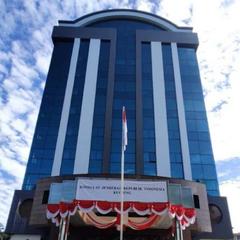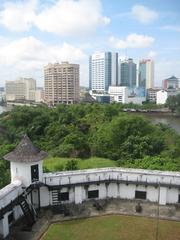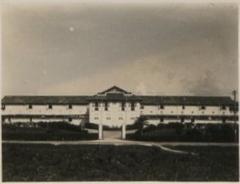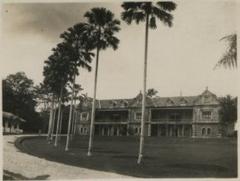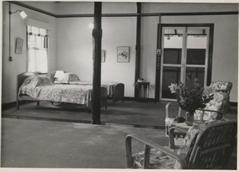Kuching Cat Museum Visiting Hours, Tickets, and Guide to Kuching Historical Sites
Date: 04/07/2025
Introduction
Perched atop Bukit Siol in Petra Jaya, Kuching, Malaysia, the Kuching Cat Museum is celebrated as the world’s first and largest museum dedicated solely to cats and feline culture. Since its opening in 1993, the museum has captivated visitors with more than 4,000 artifacts, artworks, photographs, and memorabilia, each highlighting the enduring bond between humans and cats across civilizations. Housed within the iconic Kuching North City Hall, the museum is a symbol of Kuching’s affectionate moniker, “Cat City,” and offers sweeping views of the city below. With four galleries chronicling everything from ancient Egyptian cat mummies and regional folklore to contemporary cat art and pop culture, the Kuching Cat Museum is a must-see for tourists, families, and feline aficionados. This comprehensive guide provides essential information on visiting hours, tickets, accessibility, and nearby attractions, enriching your experience with cultural and historical context (Travel + Leisure Asia; BBC Travel; 360tour.asia).
Table of Contents
- Introduction
- Origins and Historical Evolution
- Cultural Significance
- The Museum as a Living Cultural Space
- Notable Artifacts and Exhibits
- Visiting Hours, Tickets, and Location
- Travel Tips and Nearby Attractions
- Photographic Highlights
- Frequently Asked Questions (FAQ)
- Conclusion
- Sources
1. Origins and Historical Evolution
The Kuching Cat Museum was officially opened on November 6, 1993, on the ground floor of the Kuching North City Hall (Dewan Bandaraya Kuching Utara) at Bukit Siol. Spanning over 1,035 square meters, it houses more than 4,000 exhibits (360tour.asia; Travel + Leisure Asia). Its creation is tightly bound to Kuching’s identity as “Cat City.” The city’s name, possibly derived from the Malay word for cat (“kucing”), is the subject of various local legends and theories. One popular tale recounts that James Brooke, the first White Rajah of Sarawak, mistook a local’s mention of a passing cat for the city’s name (BBC Travel). Other theories cite the abundant “mata kuching” (cat’s eye) fruit or the prevalence of tailless cats along the Sarawak River (Travel + Leisure Asia).
The museum’s collection, initially acquired from the National Museum in Kuala Lumpur, has since grown to include international feline artifacts, reflecting both the universality and local significance of cats.
2. Cultural Significance
Cats as Kuching’s Local Symbol
Throughout Kuching, cats are celebrated in public art, city crests, and even the names of radio stations and colleges. Monumental cat statues adorn intersections, and during festivals, these statues are dressed in traditional attire (BBC Travel; Travel + Leisure Asia). Cat motifs also appear in indigenous crafts, believed to offer protection and good fortune.
Multicultural Reverence
Kuching’s population is a tapestry of Malays, Chinese, Indians, and indigenous groups. Cats occupy a special place across these cultures: as symbols of luck in Chinese tradition, revered animals in Islam, and practical pest-controllers in Borneo’s rural history. Notably, the 1950s “Operation Cat Drop” saw the British Royal Air Force parachute thousands of cats into Sarawak to combat a rat infestation (BBC Travel).
Global and Historical Perspectives
The museum traces the cat-human relationship across civilizations, featuring Egyptian cat mummies, depictions of Bastet, and artifacts illustrating the spread of cats from Egypt to Asia and Europe. Exhibits also explore cats’ roles in spiritual and mythological traditions (Travel + Leisure Asia).
3. The Museum as a Living Cultural Space
While the museum itself does not house live cats, Kuching is home to several cat cafés and feline-themed businesses. The museum’s gift shop and markets offer cat-themed souvenirs, and the space serves as a hub for education and cultural preservation, hosting periodic art exhibitions and special events (BBC Travel; Travel + Leisure Asia).
4. Notable Artifacts and Exhibits
- Mummified Egyptian Cats & Bastet Statues: Illustrating ancient reverence for cats.
- Royal Cat Family Statue & Cat Monuments: Iconic photo ops at the entrance and throughout the city (360tour.asia).
- Maneki Neko Figurines & Asian Cat Iconography: Highlighting regional symbolism.
- Local Beaded Carriers & Crafts: Unique to Sarawak’s indigenous culture.
- Cat-Themed Art, Philately, and Curiosities: Including stamps, toys, and pop culture collectibles.
- Cat Cave: Showcasing wild cat species native to Borneo.
5. Visiting Hours, Tickets, and Location
- Opening Hours: Daily, 9:00 AM – 4:30 PM (closed on public holidays).
- Tickets: Admission is free for locals. Tourists may be asked for a small donation (RM 3–5). Camera use may incur a nominal fee.
- Accessibility: Fully wheelchair accessible with ramps and elevators.
- Location: Ground floor, Kuching North City Hall, Bukit Siol, Petra Jaya; about 10 minutes by car from Kuching city center. Ample parking available; accessible by taxi or ride-hailing apps.
6. Travel Tips and Nearby Attractions
- Best Time to Visit: Weekday mornings are least crowded. July is busier due to school holidays and festivals (Wanderlog).
- What to Bring: Comfortable shoes, camera (check for photography fees), water bottle.
- Nearby Attractions: Sarawak State Museum, Fort Margherita, Kuching Waterfront, and the city’s famous cat statues.
- Food & Amenities: A cafeteria is available in the City Hall building. The museum complex provides restrooms and rest areas; food and drinks are not allowed inside galleries.
7. Photographic Highlights
Don’t miss panoramic city views from the museum’s hilltop location and the Royal Cat Family Statue outside. Inside, each themed gallery offers distinctive photo opportunities, from ancient artifacts to whimsical pop culture displays.
8. Frequently Asked Questions (FAQ)
Q: What are the Kuching Cat Museum visiting hours?
A: Daily, 9:00 AM – 4:30 PM (closed on public holidays).
Q: Is there an entrance fee?
A: Admission is free for locals; tourists may be asked for a small donation. Camera fees may apply.
Q: Is the museum wheelchair accessible?
A: Yes, ramps and elevators are available.
Q: How do I get to the museum from Kuching city center?
A: By taxi, ride-hailing app, or car; about 10 minutes from the city center.
Q: Are guided tours available?
A: Occasionally, especially during special events. Contact the museum in advance.
Q: Is photography allowed?
A: Yes, for personal use; flash may be restricted.
Q: Are there family-friendly activities?
A: Yes, including interactive exhibits and children’s workshops during holidays.
9. Conclusion
The Kuching Cat Museum is more than an attraction for cat lovers: it is a vibrant cultural hub, offering a window into the historical, artistic, and social significance of cats in both local and global contexts. With its unique blend of education, entertainment, and scenic charm, the museum stands out as a top Kuching historical site. Whether you’re interested in ancient artifacts, modern pop culture, or simply want to experience the spirit of “Cat City,” the museum promises a memorable visit for all ages. For the latest updates and special events, check the official museum website or local tourism portals.
10. Sources
- Travel + Leisure Asia
- BBC Travel
- 360tour.asia
- Pineqone
- Holidify
- Gokayu
- Wanderlog
- Official Museum Website
- Agoda Guide
